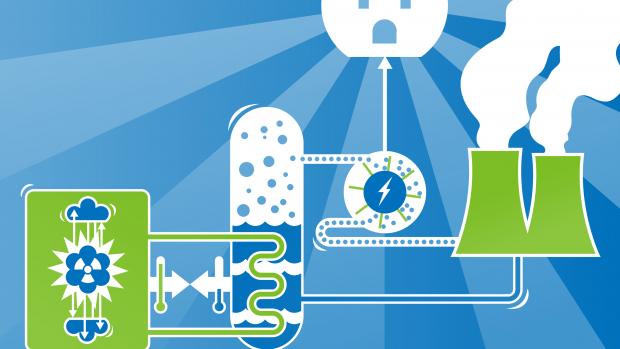Smarter Homer Simpsons On the Way: Grant from the Nuclear Regulatory Commission fuels new curricula

For the current generation of college students, a nuclear power plant is where Homer Simpson works, not the site of potentially catastrophic accidents able to wipe out entire populations for years to come — “and that’s a good thing,” says Professor Lorcan Folan, head of NYU-Poly’s physics department. “The Simpsons have made the notion of working at a power plant almost mundane. It demystifies the subject.”
Professor Folan, with colleagues Professors George Vradis and Valery Sheverev, received funding of almost $200,000 from the Nuclear Regulatory Commission (NRC) to work towards that same goal. By developing curricula on nuclear technology, he and his team have been able to reintroduce courses on the subject, allowing NYU-Poly to offer a concentration in nuclear sciences and engineering. Students majoring in a range of engineering programs may enroll for it, with the inaugural course presented last spring. Two more courses are now available.
Professors Folan, Sheverev, and Vradis designed the classes last year with funding from the NRC. This year, along with Professors Barry Blecherman, Francisco De Leon, Said Nourbakhsh, and Richard Wener, they hope to add four more courses and eventually offer a minor in nuclear sciences and engineering.
Perfect timing
Their efforts couldn’t be more timely. Greener energy sources have become a hot topic, and “suddenly nuclear power is not such a terrible option,” says Professor Folan. Environmentalists who railed against nuclear technology 30 years ago because of accidents at Three Mile Island and Chernobyl now see it as a potentially positive alternative to nonrenewable energy sources quickly dwindling in the face of rising global populations.
The government has joined environmentalists in championing the cause. In 2005, legislators passed the Energy Policy Act, which included tax breaks, subsidies, and incentives intended to boost activity in the nuclear sector. Professionals in the power industry who experienced regulatory roadblocks in the past now welcome the new policy direction, as well as the change of heart among environmentalists. Today companies, such as Duke Energy, are exploring the idea of opening new nuclear power plants.
But this trend coincides with the retirement plans of an aging workforce. “Many of the people who were hired to run existing plants were hired in the 1960s and ‘70s,” Professor Folan explains. “They’re now getting ready to retire, but you can’t have a nuclear power plant without competent people to run it.”
What job application?
The diminished talent pool means qualified graduates find themselves weighing multiple job offers. Those are excellent circumstances for jobseekers in today’s cutthroat labor market, but as might be expected, employers want a more level playing field.
Hence, the focus on nuclear engineering programs, which number in the low 30s nationwide. (According to the American Nuclear Society, there were 65 such programs in 1980.) The nuclear community is eager to see that figure rise, which is why the work of Professor and his team has been so well received by industry and government laboratories, as well as students. The team counts representatives from Brookhaven National Laboratory, Constellation Energy, Dominion, Entergy, Excelon, Public Service Enterprise Group, and the NRC among its advisory committee, and as Professor Folan likes to remind his classes, those partners are likely to look favorably upon NYU-Poly students interested in joining their ranks. Now is the time to look into internships if you want to land one for next summer, he says.
D’oh!
Power plants aren’t the sole employers of nuclear engineers, though. Professor Folan is quick to point out that nuclear engineers make up just a small portion of the workers at a plant. Mechanical, electrical, chemical, and civil engineers work alongside skilled tradesmen in the operation and construction of nuclear facilities.
In fact, who says being an expert in nuclear technology means you have to work at a power plant? The medical and oil industries, as well as the government (hey, someone’s got to take those legislative roadblocks down), also hire prospects educated in the nuclear sciences. The operative word here is “educated,” though, and students would do well to look into new and developing courses from Professor Folan and his colleagues.




